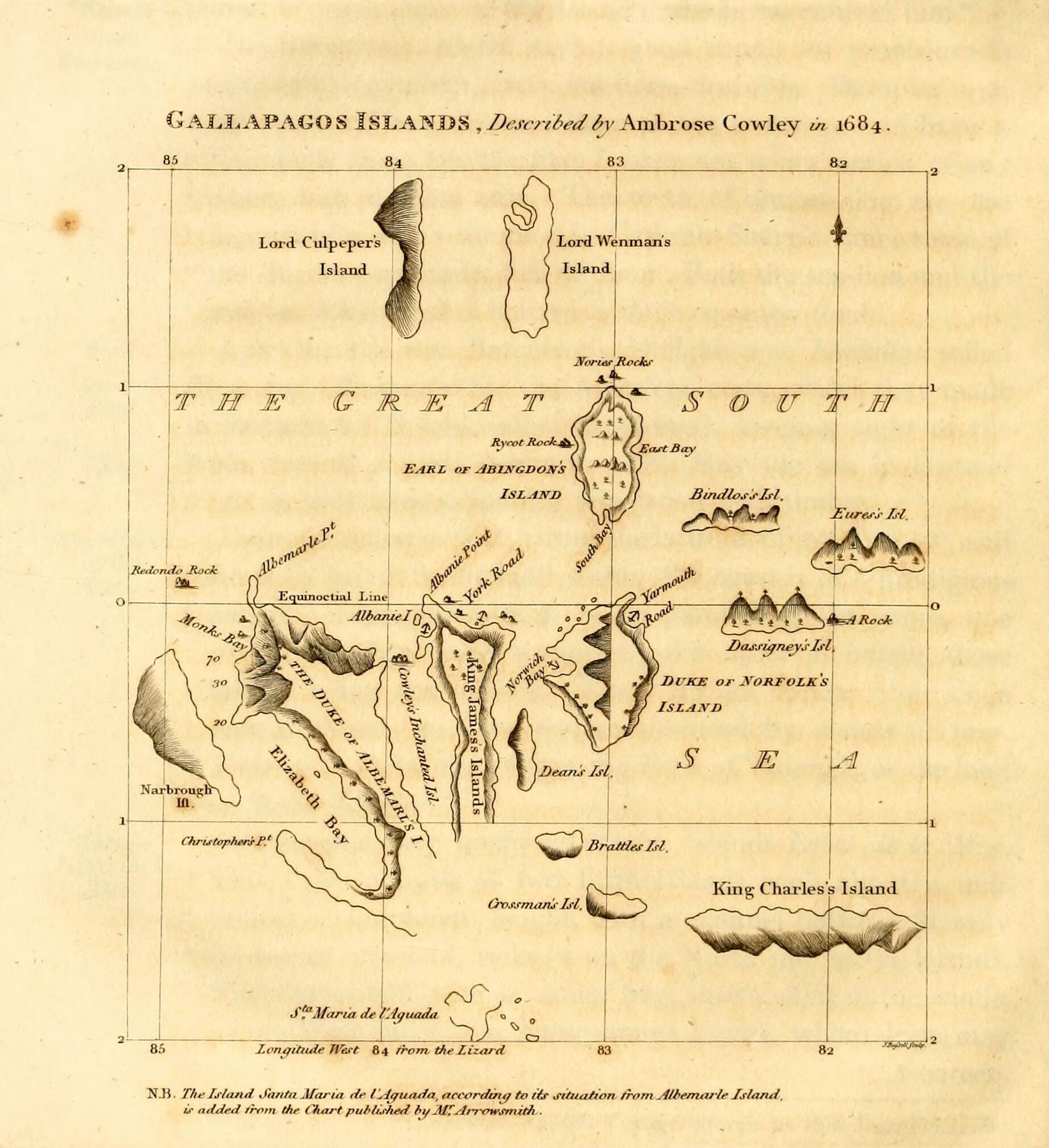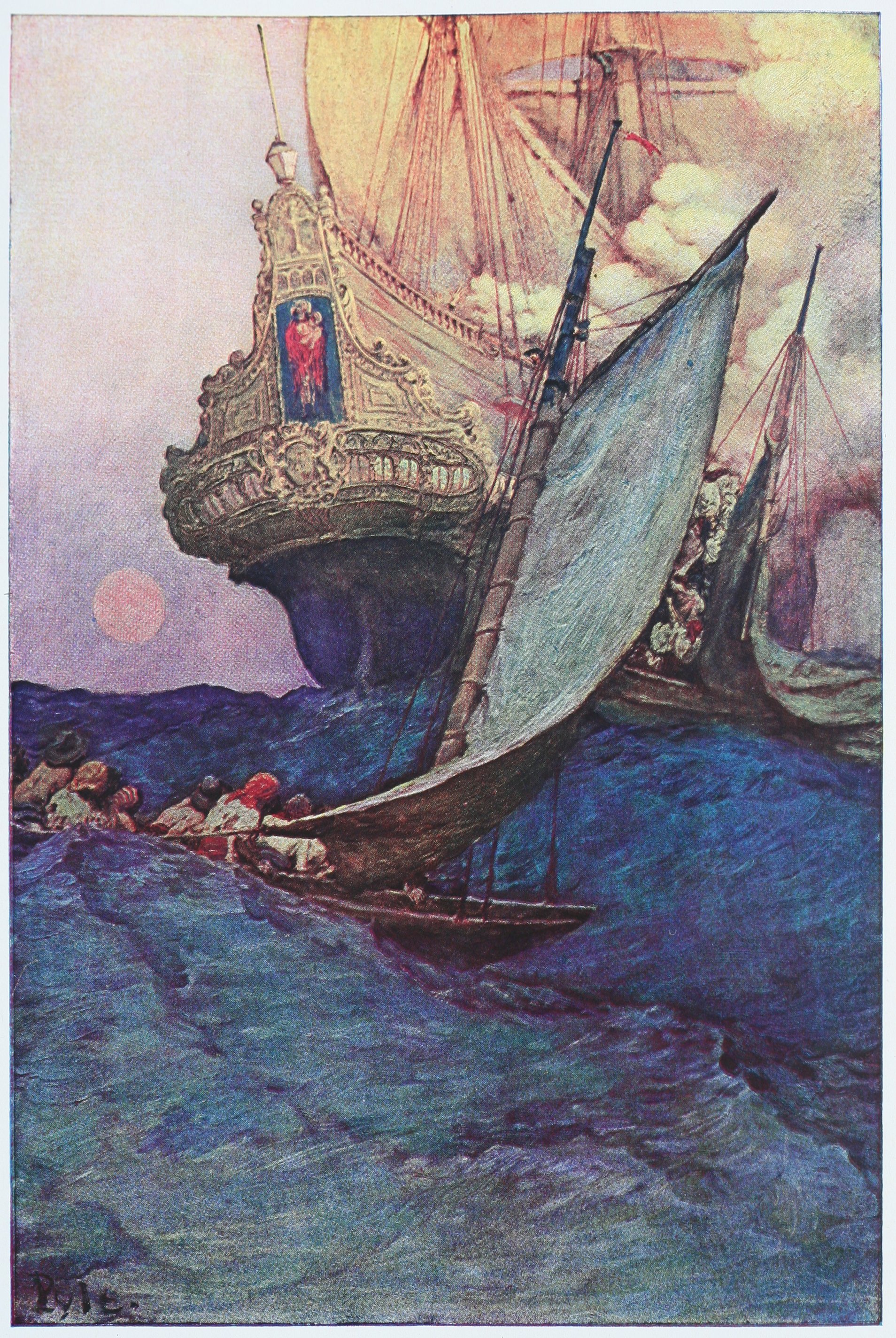|
William Cowley
William Ambrosia Cowley was a 17th-century English buccaneer who surveyed the Galápagos Islands during his circumnavigation of the world while serving under several Captains such as John Eaton, John Cook, and later Edward Davis. Cowley published the first chart of the islands in 1684. In his diary he reported the discovery of the mythical Pepys Island, allegedly situated north of the Falkland Islands, prompting a number of mariners to look in vain for the nonexistent land. References *William Ambrosia Cowley. ''Cowley's Voyage Round the Globe'', in ''Collection of Original Voyages'', ed. William Hacke. London: James Knapton, 1699. https://web.archive.org/web/20180120160933/http://www.galapagos.to/TEXTS/COWLEY.HTM *1686 “A Short Account of My Voyage Round this Terestiall Globe of the World from Virginia to England and through the Great South Sea.” In Miscellanea Curiosa. Richmond, Virginia: Virginia Historical Society Mss1. T8525a3, Vol IV (letter written by Cowley descri ... [...More Info...] [...Related Items...] OR: [Wikipedia] [Google] [Baidu] |
English People
The English people are an ethnic group and nation native to England, who speak the English language, a West Germanic language, and share a common history and culture. The English identity is of Anglo-Saxon origin, when they were known in Old English as the ('race or tribe of the Angles'). Their ethnonym is derived from the Angles, one of the Germanic peoples who migrated to Great Britain around the 5th century AD. The English largely descend from two main historical population groups the West Germanic tribes (the Angles, Saxons, Jutes and Frisians) who settled in southern Britain following the withdrawal of the Romans, and the partially Romanised Celtic Britons already living there.Martiniano, R., Caffell, A., Holst, M. et al. Genomic signals of migration and continuity in Britain before the Anglo-Saxons. Nat Commun 7, 10326 (2016). https://doi.org/10.1038/ncomms10326 Collectively known as the Anglo-Saxons, they founded what was to become the Kingdom of England by t ... [...More Info...] [...Related Items...] OR: [Wikipedia] [Google] [Baidu] |
Buccaneer
Buccaneers were a kind of privateers or free sailors particular to the Caribbean Sea during the 17th and 18th centuries. First established on northern Hispaniola as early as 1625, their heyday was from the Restoration in 1660 until about 1688, during a time when governments were not strong enough and did not consistently attempt to suppress them. Originally the name applied to the landless hunters of wild boars and cattle in the largely uninhabited areas of Tortuga and Hispaniola. The meat they caught was smoked over a slow fire in little huts the French called ''boucans'' to make ''viande boucanée'' – ''jerked meat'' or ''jerky'' – which they sold to the corsairs who preyed on the (largely Spanish) shipping and settlements of the Caribbean. Eventually the term was applied to the corsairs and (later) privateers themselves, also known as the Brethren of the Coast. Though corsairs, also known as ''filibusters'' or ''freebooters'', were largely lawless, privateers were n ... [...More Info...] [...Related Items...] OR: [Wikipedia] [Google] [Baidu] |
Galápagos Islands
The Galápagos Islands (Spanish: , , ) are an archipelago of volcanic islands. They are distributed on each side of the equator in the Pacific Ocean, surrounding the centre of the Western Hemisphere, and are part of the Republic of Ecuador. Located west of continental Ecuador, the islands are known for their large number of endemic species that were studied by Charles Darwin during the second voyage of HMS ''Beagle''. His observations and collections contributed to the inception of Darwin's theory of evolution by means of natural selection. The Galápagos Islands and their surrounding waters form the Galápagos Province of Ecuador, the Galápagos National Park, and the Galápagos Marine Reserve. The principal language on the islands is Spanish. The islands have a population of slightly over 25,000. The first recorded visit to the islands happened by chance in 1535, when Fray Tomás de Berlanga, the Bishop of Panamá, was surprised to find this undiscovered land on a vo ... [...More Info...] [...Related Items...] OR: [Wikipedia] [Google] [Baidu] |
John Eaton (pirate)
John Eaton ( fl. 1682-1686) was an English buccaneer and pirate active off the coasts of Spanish Central and South America. He circumnavigated the world before returning to England. History Originally a merchant captain, Eaton commanded the 80-man, 250 ton, 20-gun ''Nicholas'' out of London when he sailed for Danish St. Thomas in 1683. After a visit to Cape Verde and a raiding spree along the Brazilian coast (including time spent alongside pirate George Bond), Eaton rounded the Strait of Magellan in early 1684. It was there he met the ''Cygnet'' under Charles Swan, who tried to conduct legitimate trade with the Spanish before turning to piracy. ''Nicholas'' soon met with the ''Bachelor's Delight'' under John Cook (who soon died and was replaced by Edward Davis) and separated from ''Cygnet''. Eaton and Davis sailed together for several months, attacking Spanish shipping off Peru and other settlements. They met at Cocos Island, La Plata, and Juan Fernandez before Davis sail ... [...More Info...] [...Related Items...] OR: [Wikipedia] [Google] [Baidu] |
John Cook (pirate)
John Cook (died 1684) was an English buccaneer, privateer, and pirate. History In 1679, when he was still a merchant captain, Cook abandoned his ship on the island of Bonaire to escape the Spanish. He then joined the assembly of buccaneers serving under Bartholomew Sharpe. The fleet separated in 1681 after disagreements between Captains Sharpe, John Coxon, and John Watling; Cook led a group electing to leave the South Seas and return to the West Indies. Among the sailors joining him were surgeon Lionel Wafer and navigator William Dampier. Cooke then sailed with the crew of William Wright and Jan Willems (aka "Yankey"), serving as quartermaster until granted command of a ship they had taken. Unfortunately, the French authorities of Santo Domingo confiscated the ship for piracy because he had failed to obtain a privateering commission. In 1682 Cook and a few men (including Edward Davis) joined the French captain Jean Tristan, whose boat he stole and sailed to the west coast ... [...More Info...] [...Related Items...] OR: [Wikipedia] [Google] [Baidu] |
Edward Davis (buccaneer)
Edward Davis or Davies (fl. c. 1680–1688) was an English buccaneer active in the Caribbean during the 1680s and would lead successful raids against Leon and Panama in 1685, the latter considered one of the last major buccaneer raids against a Spanish stronghold. Much of his career was later recorded by writer William Dampier in ''A New Voyage Round the World'' (1697). Early career Possibly of Flemish ancestry, he is first recorded as one of the members of the ''Pacific Adventure'' led by Bartholomew Sharp and John Coxon in 1680. But first and foremost he emerges in the Caribbean on a French privateer commanded by Captain Yanky. He was transferred to Captain Tristian's ship, the crew mutinied at Petit-Goâve, southwest of Port-au-Prince in Saint-Domingue (Haiti). Davis then sailed under Capt John Cook arriving in April 1683 at Chesapeake Bay, where he met William Dampier. Briefly serving as a navigator, he and several others including James Kelly left the expedition ... [...More Info...] [...Related Items...] OR: [Wikipedia] [Google] [Baidu] |
Pepys Island
Pepys Island is a phantom island, once said to lie about north of the Falkland Islands at 47°S.James BurneyA Chronological History of the Discoveries in the South Sea Or Pacific Ocean accessed 25 July 2010 Pepys Island is now believed to have been a misidentified account of the Falkland Islands. Original identification In December 1683 the British corsair William Ambrose Cowle(y), master of the ''Bachelor's Delight'', a ship of 40 guns proceeding on a circumnavigation of the globe, discovered at a latitude stated as 47°S a previously uncharted and unpopulated island in the South Atlantic which he named "Pepys Island", for Samuel Pepys, Secretary to the Admiralty. His companion on the voyage, William Dampier, considered the sighting to be the "Sebaldinas Islands", an alternative name at the time for the Falklands. Cowle's log entry reads:Antonio de Viedma, ''Diarios de navegación – expediciones por las costas y ríos patagónicos'' (1780–1783), Ediciones Continente repr ... [...More Info...] [...Related Items...] OR: [Wikipedia] [Google] [Baidu] |
Falkland Islands
The Falkland Islands (; es, Islas Malvinas, link=no ) is an archipelago in the South Atlantic Ocean on the Patagonian Shelf. The principal islands are about east of South America's southern Patagonian coast and about from Cape Dubouzet at the northern tip of the Antarctic Peninsula, at a latitude of about 52°S. The archipelago, with an area of , comprises East Falkland, West Falkland, and 776 smaller islands. As a British overseas territory, the Falklands have internal self-governance, but the United Kingdom takes responsibility for their defence and foreign affairs. The capital and largest settlement is Stanley on East Falkland. Controversy exists over the Falklands' discovery and subsequent colonisation by Europeans. At various times, the islands have had French, British, Spanish, and Argentine settlements. Britain reasserted its rule in 1833, but Argentina maintains its claim to the islands. In April 1982, Argentine military forces invaded the islands. Brit ... [...More Info...] [...Related Items...] OR: [Wikipedia] [Google] [Baidu] |
William Dampier
William Dampier (baptised 5 September 1651; died March 1715) was an English explorer, pirate, privateer, navigator, and naturalist who became the first Englishman to explore parts of what is today Australia, and the first person to circumnavigate the world three times. He has also been described as Australia's first natural historian, as well as one of the most important British explorers of the period between Francis Drake (16th century) and James Cook (18th century), he "bridged those two eras" with a mix of piratical derring-do of the former and scientific inquiry of the later. His expeditions were among the first to identify and name a number of plants, animals, foods, and cooking techniques for a European audience; being among the first English writers to use words such as avocado, barbecue, and chopsticks. In describing the preparation of avocados, he was the first European to describe the making of guacamole, named the breadfruit plant, and made frequent documenta ... [...More Info...] [...Related Items...] OR: [Wikipedia] [Google] [Baidu] |
English Pirates
English usually refers to: * English language * English people English may also refer to: Peoples, culture, and language * ''English'', an adjective for something of, from, or related to England ** English national identity, an identity and common culture ** English language in England, a variant of the English language spoken in England * English languages (other) * English studies, the study of English language and literature * ''English'', an Amish term for non-Amish, regardless of ethnicity Individuals * English (surname), a list of notable people with the surname ''English'' * People with the given name ** English McConnell (1882–1928), Irish footballer ** English Fisher (1928–2011), American boxing coach ** English Gardner (b. 1992), American track and field sprinter Places United States * English, Indiana, a town * English, Kentucky, an unincorporated community * English, Brazoria County, Texas, an unincorporated community ... [...More Info...] [...Related Items...] OR: [Wikipedia] [Google] [Baidu] |
17th-century English People
The 17th century lasted from January 1, 1601 ( MDCI), to December 31, 1700 ( MDCC). It falls into the early modern period of Europe and in that continent (whose impact on the world was increasing) was characterized by the Baroque cultural movement, the latter part of the Spanish Golden Age, the Dutch Golden Age, the French ''Grand Siècle'' dominated by Louis XIV, the Scientific Revolution, the world's first public company and megacorporation known as the Dutch East India Company, and according to some historians, the General Crisis. From the mid-17th century, European politics were increasingly dominated by the Kingdom of France of Louis XIV, where royal power was solidified domestically in the civil war of the Fronde. The semi-feudal territorial French nobility was weakened and subjugated to the power of an absolute monarchy through the reinvention of the Palace of Versailles from a hunting lodge to a gilded prison, in which a greatly expanded royal court could be more easil ... [...More Info...] [...Related Items...] OR: [Wikipedia] [Google] [Baidu] |




